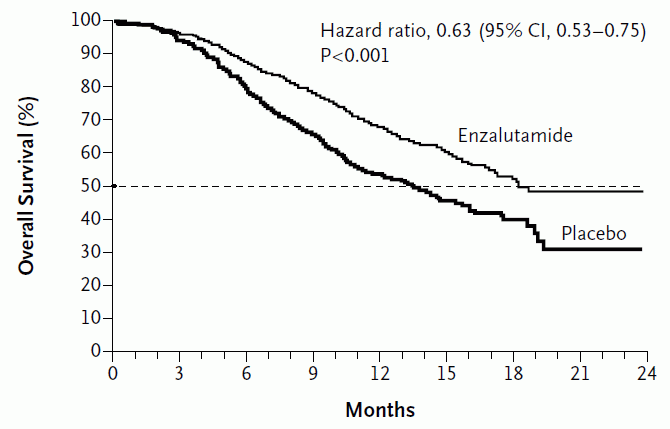| zurück |
AFFIRM: Enzalutamid nach Chemotherapie beim HRPC |
| Titel |
A Study Evaluating the Efficacy and Safety of the
Investigational Drug MDV3100 (= Enzalutamid ) |
| Fragestellung |
Verlängert Enzalutamid das Überleben
metastasierter, hormonrefraktärer Patienten mit Prostatakarzinom nach
Chemotherapie? |
| Ergebnis |
Mit Enzalutamid war das mediane Überleben mit 18,4
Monaten signifikant höher als mit Plazebo (13,6 Monate).

Aus (1). |
| Enzalutamid |
Androgen - Rezeptor - Signal - Inhibitor |
| Ergebnis |
 |
mit Enzalutamid |
ohne Enzalutamid |
p |
| median Survival |
18,4 Monate |
13,6 Monate |
<0,001 |
| PSA-Abfall >50% |
54% |
2% |
<0,001 |
| Weichteil-Response |
29% |
4% |
<0,001 |
| QLQ-Verbesserung |
43% |
18% |
<0,001 |
| Zeit bis zum PSA-Anstieg |
8,3 Monate |
3 Monate |
<0,001 |
| PFS (Bildgebung) |
8,3 Monate |
2,9 Monate |
<0,001 |
| Zeit bis zur Skelett-Komplikation |
16,7 Monate |
13,3 Monate |
|
|
| Nebenwirkungen |
Enzalutamid passiert die Blut-Hirn - Schranke und kann Krämpfe auslösen
(0,6%). Fatigue, Diarrhoe, Hitzewallungen |
| Studie |
Phase III, doppelt blind, Placebo - kontrolliert.
Randomisiert 2: 1 Enzalutamid - Placebo. Stratifizierung nach
Performancestatus und Schmerzintensität. Abbruch nach Interimaanalyse von 520
Sterbefällen. |
| Patienten |
1199 Männer mit HRPC nach Chemotherapie. 156
Kliniken in 15 Ländern. USA, Kanada, Europa
| Anzahl |
1199 |
| Kliniken |
156 |
| Länder |
15 |
| Alter |
bis 65a |
362 |
| >65a |
837 |
| Performance |
1-2 |
1097 |
| 2 |
102 |
| Endokrine Vorbehandlung |
1-2 |
587 |
| >2 |
605 |
| vorausgehende Chemotherapie |
1 |
875 |
| >1 |
324 |
|
| Behandlungs-Arm |
oral 160 mg Enzalutamide / Tag, 800 Patienten |
| Kontrollarm |
Placebo 399 Patienten |
| Quelle |
1.) Scher HI, et al. for the AFFIRM Investigators:
Increased Survival with Enzalutamide in Prostate Cancer after Chemotherapy
NEJM 367(2012):1187-1197
2.) Scher HI, et al.:
Antitumour activity of MDV3100 in castration-resistant prostate cancer: a
phase1-2 study.
Lancet 375(2010):1437-46
|
 |


